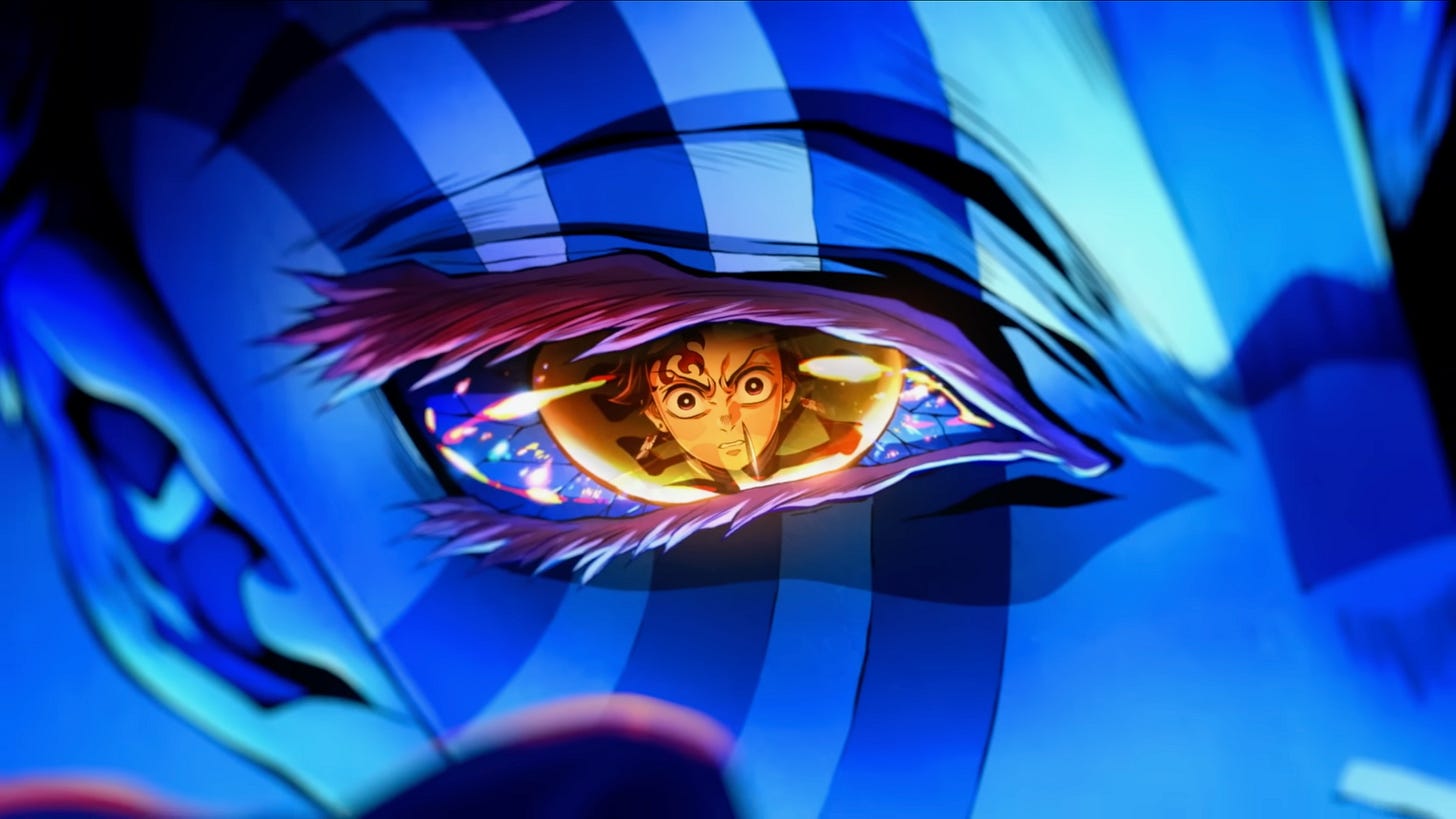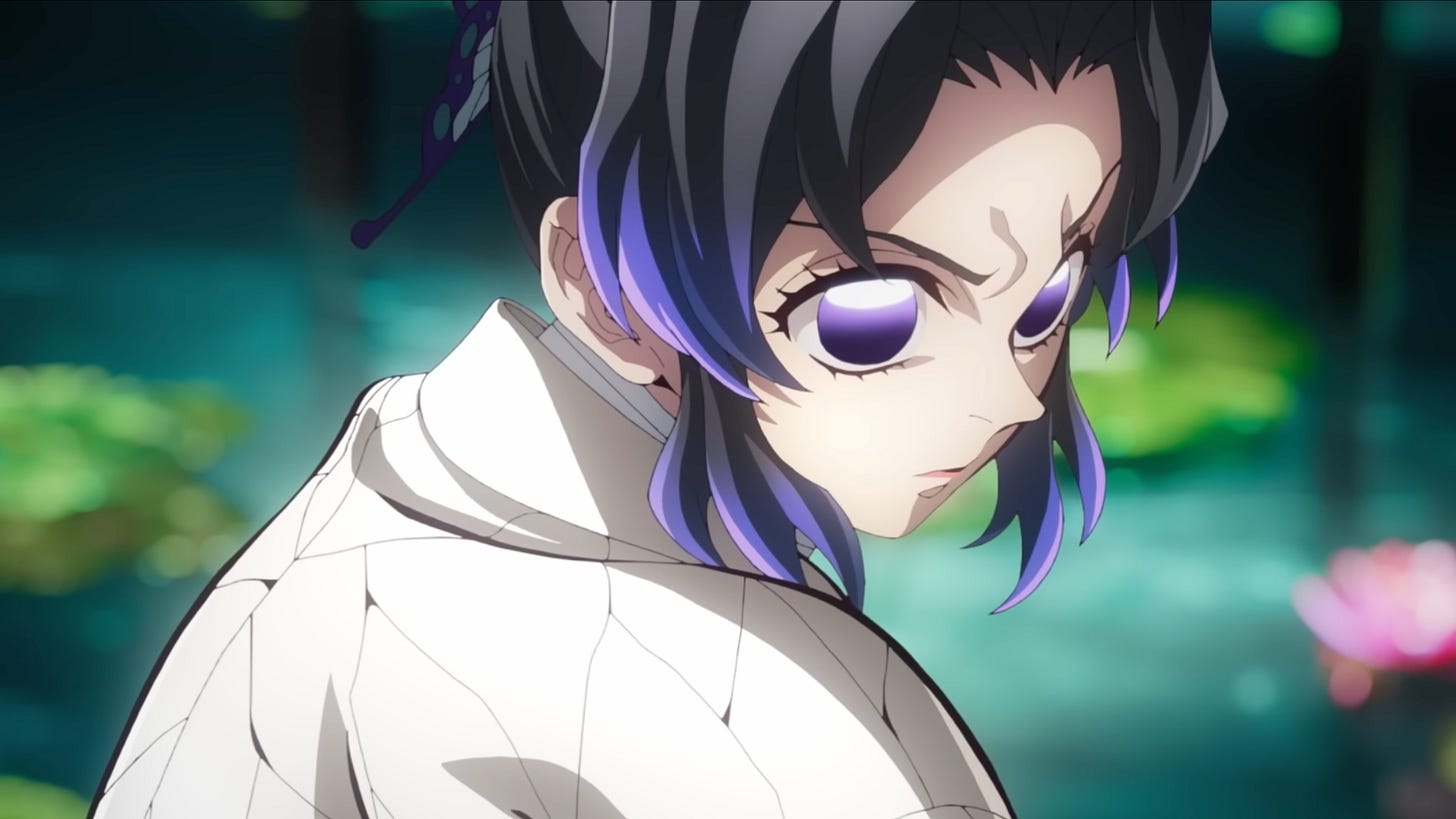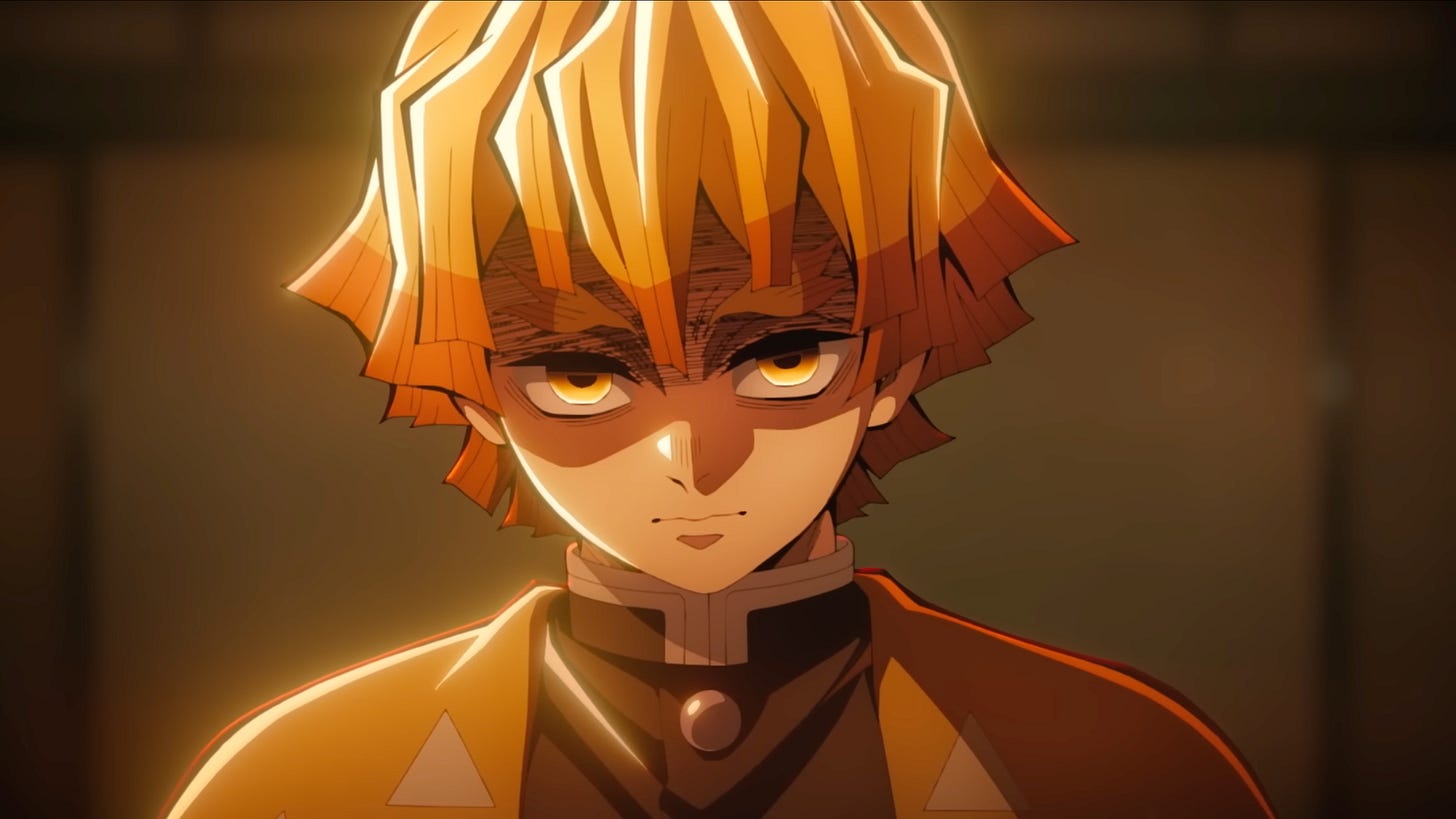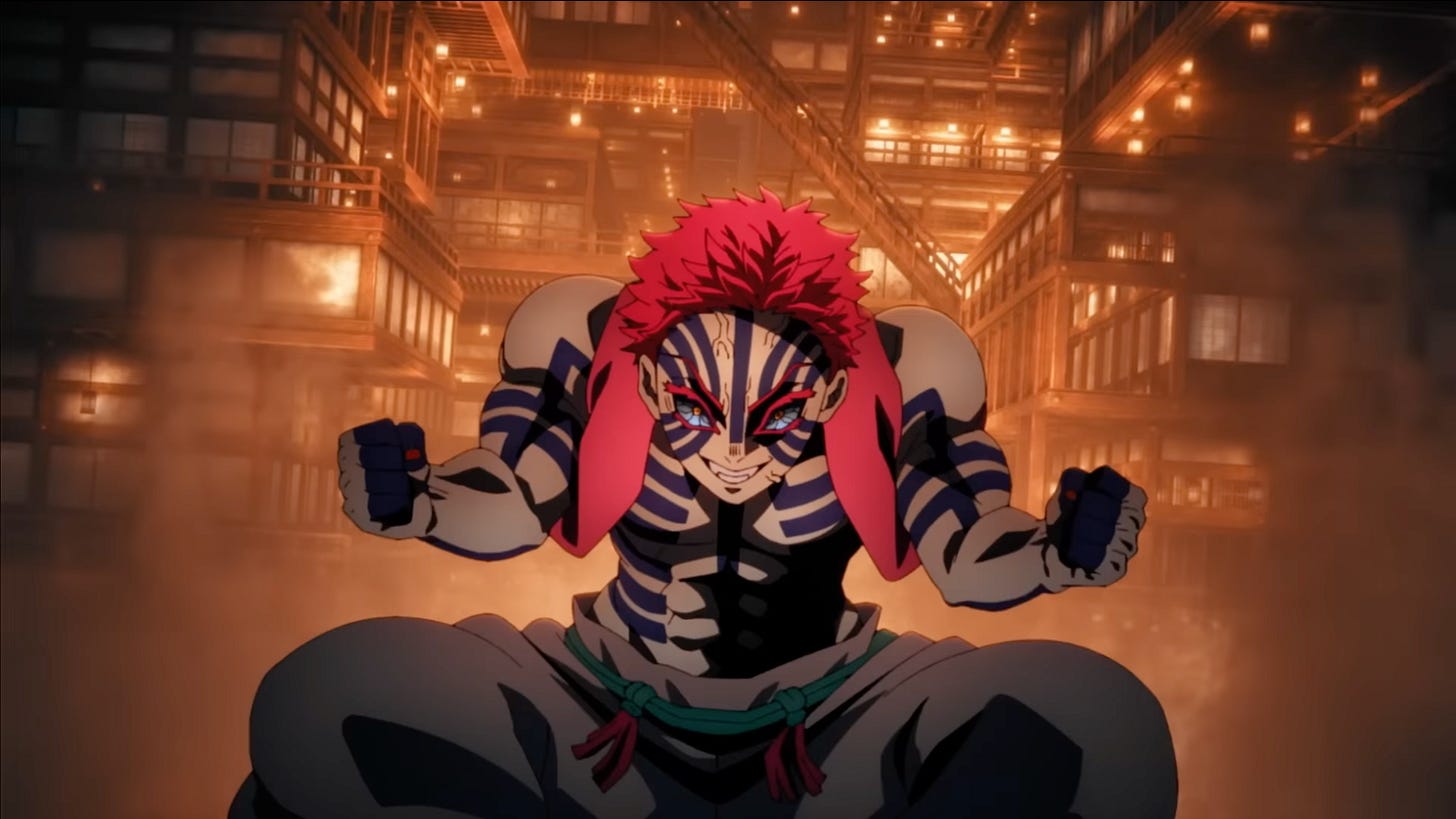Review: "Demon Slayer" Returns to Theaters with "Infinity Castle Part I: Akaza Returns"
As always, ufotable works miracles
If you’re looking for a skeptical take or a ‘view from nowhere’ on the latest installment of Kimetsu no Yaiba, move along. I am, I will freely admit, fully in the tank for this series, and I was breathlessly excited for the Infinity Castle movie long before it was ever even announced. In addition to loving this series in both its manga and anime form, I am particularly obsessed with the space of the eponymous Castle as visualized by ufotable, the studio behind the Kimetsu anime, such that my doctoral dissertation proposes a whole theoretical framework called “The Infinite Castle.” That chapter took by far the most time and energy to write of anything I did as a Ph.D. student, as the glimpses of this space ufotable gave us in the TV series honestly reoriented my entire perception of animation and the relationship between 2D and 3D spatial relations. It is the bedrock of much of my dissertation, of years of my life’s work. Finally walking into an IMAX and watching an entire film set in this environment unfold before my eyes, at such colossal scale, was a big moment for me. That I loved it almost goes without saying. Like every part of ufotable’s adaptation so far, this movie feels like a miracle.
For the uninitiated: Demon Slayer: Kimetsu no Yaiba – The Movie: Infinity Castle (yes, the English title is a needlessly unwieldy mouthful) is the second original film in the Kimetsu no Yaiba anime series, following four seasons of television and one prior feature (2020’s Mugen Train). In Japanese, the film also includes the subtitle Part I: Akaza Returns, as this is the first installment in a film trilogy that will bring the series’ story to a close, collectively adapting the last 66 chapters of Gotouge Koyoharu’s original manga. Even as Part 1 of 3, Akaza Returns is already a major event unto itself: at 155 minutes, it is one of the longest animated films ever produced, and in Japan, it has smashed every available box office record – most of them set by its predecessor, Mugen Train – on its way to becoming the third highest-grossing film in the country’s history (it will almost certainly overtake Miyazaki Hayao’s Spirited Away to move into the number 2 spot, right behind Mugen Train at number 1). As it opens theatrically this weekend in the United States, it is poised to break records here too, likely delivering the biggest opening weekend not only for a Japanese anime film, but for foreign cinema writ large.
From a business standpoint, the reasons for adapting this last batch of material as a film trilogy are obvious: the monetary rewards these three films will reap are simply beyond anything ever seen in the history of Japanese cinema, let alone Japanese animation. But the impetus here extends beyond the financial. On a practical level, there is simply too much story to cover in these last 66 manga chapters to fit into a single anime season, and no clean breaking point that makes televisual narrative sense; partially adapting it would be frustrating, and trying to do it all at once with an extended episode count would dilute the quality of ufotable’s infamously spectacular animation. Creatively, this material is indeed better suited to cinema, where ufotable gets to shape everything into three films instead of dozens of individual episodes, and scenes get to both breathe and stay focused in a way the commercial breaks and limited run-times of TV installments would bely. After a fast-paced opening briefly catching up with each of the film’s many characters, Akaza Returns quickly settles into a more focused rhythm, where scenes play out at length and reach real points of transformation or resolution before cutting somewhere else. The film’s first major confrontation, between the Insect Hashira Kocho Shinobu and the demons’ Upper Rank Two, Doma, is an immediate validation of ufotable’s choice to adapt Infinity Castle as films: the scene simply moves and breathes with an uninterrupted focus and clarity, and we get lost in the drama.
That isn’t to suggest Akaza Returns is structurally simple or neat, in the way the shorter and more standalone Mugen Train was. That film is a note-perfect model of both Hollywood three-act structure and Japanese kishōtenketsu storytelling, depending on one’s perspective. Akaza Returns is, of course, the first part of a trilogy; it lacks an ‘ending’ in the traditional sense, and large parts of it are set-up for pay-offs we won’t see until future installments. On its own, this first stage of Infinity Castle is more akin to a triptych film than a traditional narrative feature, with three stories that build on one another thematically but are not strictly connected in terms of clear ‘A to B to C’ story progression. It has some of the most spectacular visuals and impactful animation one will ever see, but it is also ultimately more interested in the interiority of its characters – even and especially its demonic villains – than it is in mayhem and bombast, with the final stretch devoted to a wholly internalized flashback that is long, quiet, and introspective. Part of me wants to describe it as the Shōnen battle anime equivalent of Hamaguchi Ryusuke’s Wheel of Fortune and Fantasy, which sounds completely absurd except for the ways both films wring big, surprising emotions out of the viewer in their third, most substantive story.
All of which is to say I think Infinity Castle Part I works, in unconventional and unexpected ways, and it often works fantastically. That’s in no small part because ufotable is executing at such a ridiculously high bar from moment to moment, assisted by an absurdly stacked Japanese voice cast that tears into every line with spine-tingling aplomb (as the eponymous Akaza, the great Ishida Akira steals the show this time around, delivering a showstopping vocal performance that just keeps layering on complexity and pathos right until the end credits roll). But the unusual structural gambits also work because ufotable, as always, finds such rich thematic connections in Gotouge’s source material, assembling the threads in such a way that this individual chapter feels like a whole unto itself.
Each of the three battles this film chronicles are about mentors and students, or parents and children, and sometimes both. They’re about learners trying to live up to teachers, or lashing out because of the ways they’ve failed those who taught them. Shinobu fights for her older sister, and passes the torch to her student, Kanao; Zenitsu fights a former brother, turned into an opposing shadow self, in order to avenge his grandfather, who was also their teacher; Tanjiro summons the strength to go toe to toe with Akaza by remembering his departed father, and Akaza, in turn, manages to confront himself and what he has become by recalling his own father and mentor. These are all aspects of the same story, refracted upon each other in much the same way the Infinite Castle itself reflects space in an ersatz Escher-like mirror. And in the end, what all these stories are about is what Kimetsu no Yaiba as a whole is about, which is the impossibility of living this life or achieving anything of value without the love and support of others. So even when this first chapter ends and beckons forth the eventual Part II, one doesn’t feel the let-down of having watched 2.5-hours of plot arbitrarily carved from a larger chunk to come. We feel like we’ve seen a film, a complete artistic statement unto itself, as structurally unusual as it may be.
Lest it go unsaid, Akaza Returns is every bit as impressive a production as one has come to expect from this series, a spectacle that no Hollywood film this year – save perhaps James Cameron’s upcoming Avatar: Fire and Ash – is likely to match. There are moments of animation and staging throughout that blew me back in my seat, particularly in all the ways ufotable explores and manipulates three-dimensional space. Where Mugen Train felt like a big leap over the series’ first TV season in terms of production, and then subsequent seasons managed to leapfrog Mugen Train despite being made for TV, Infinity Castle absolutely feels like it ratchets everything up to a new level. That’s true of the soundtrack too, once again composed by Shiina Go and Kajiura Yuki, who build on their years of existing themes and motifs in ways that consistently feel inventive, surprising, and insightful. What they do with Akaza’s theme, first introduced via rip roaring electric guitar in Mugen Train,is particularly impressive. It goes through so many permutations here, alongside a character who proves to be much more plastic and protean than we first assumed. In its final echoes, it isn’t rip-roaring at all – it’s tragic. Five years ago, audiences around the world shed tears for the Flame Hashira Rengoku Kyojuro when he met his fate at the end of Mugen Train; the ultimate magic trick of Akaza Returns lies in making us eventually do the same for his despicable, ruthless killer.
If you have yet to begin watching Kimetsu no Yaiba, Infinity Castle is not the place to start: go back to Season 1 of the TV show, watch through to the end of Season 4 (the material from Mugen Train was also re-edited for Season 2, so you won’t miss anything), and by that point you won’t need me to tell you Akaza Returns is a film worth seeing. This series has become a global sensation for good reason, and it delights me to no end that a film as beautiful, brutal, poignant, strange, and singular as this one is going to break further commercial barriers for anime on these shores. This is ‘event cinema’ at its most rewarding, and it’s only the beginning of the end: as manga readers know, the best is very much yet to come. Given their track record so far, it’s tough to imagine just how high ufotable will soar when they get there.
Like anime? Listen to the podcast I host with Sean Chapman, JAPANIMATION STATION, where we review all sorts of anime every week. Watch on YouTube or Subscribe wherever you get your podcasts.
Read the book 200 Reviews by Jonathan R. Lack in Paperback or on Kindle
Subscribe to PURELY ACADEMIC, our monthly variety podcast about movies, video games, TV, and more





